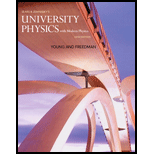Browse All Chapters of This Textbook
Book Details
The benchmark for clarity and rigor, influenced by the latest in education research.
Since its first edition, University Physics has been revered for its emphasis on fundamental principles and how to apply them. This text is known for its clear and thorough narrative, as well as its uniquely broad, deep, and thoughtful sets of worked examples that provide students with key tools for developing both conceptual understanding and problem-solving skills.
The Fourteenth Edition improves the defining features of the text while adding new features influenced by education research to teach the skills needed by today’s students. A focus on visual learning, new problem types, and pedagogy informed by MasteringPhysics metadata headline the improvements designed to create the best learning resource for physics students.
Also available with MasteringPhysics
MasteringPhysics from Pearson is the leading online homework, tutorial, and assessment system, designed to improve results by engaging students before, during, and after class with powerful content. Instructors ensure students arrive ready to learn by assigning educationally effective content before class and encourage critical thinking and retention with in-class resources such as Learning Catalytics. Students can further master concepts after class through traditional and adaptive homework assignments that provide hints and answer-specific feedback. The Mastering gradebook records scores for all automatically graded assignments in one place, while diagnostic tools give instructors access to rich data to assess student understanding and misconceptions.
Mastering brings learning full circle by continuously adapting to each student and making learning more personal than ever—before, during, and after class.
Sample Solutions for this Textbook
We offer sample solutions for University Physics with Modern Physics (14th Edition) homework problems. See examples below:
More Editions of This Book
Corresponding editions of this textbook are also available below:
